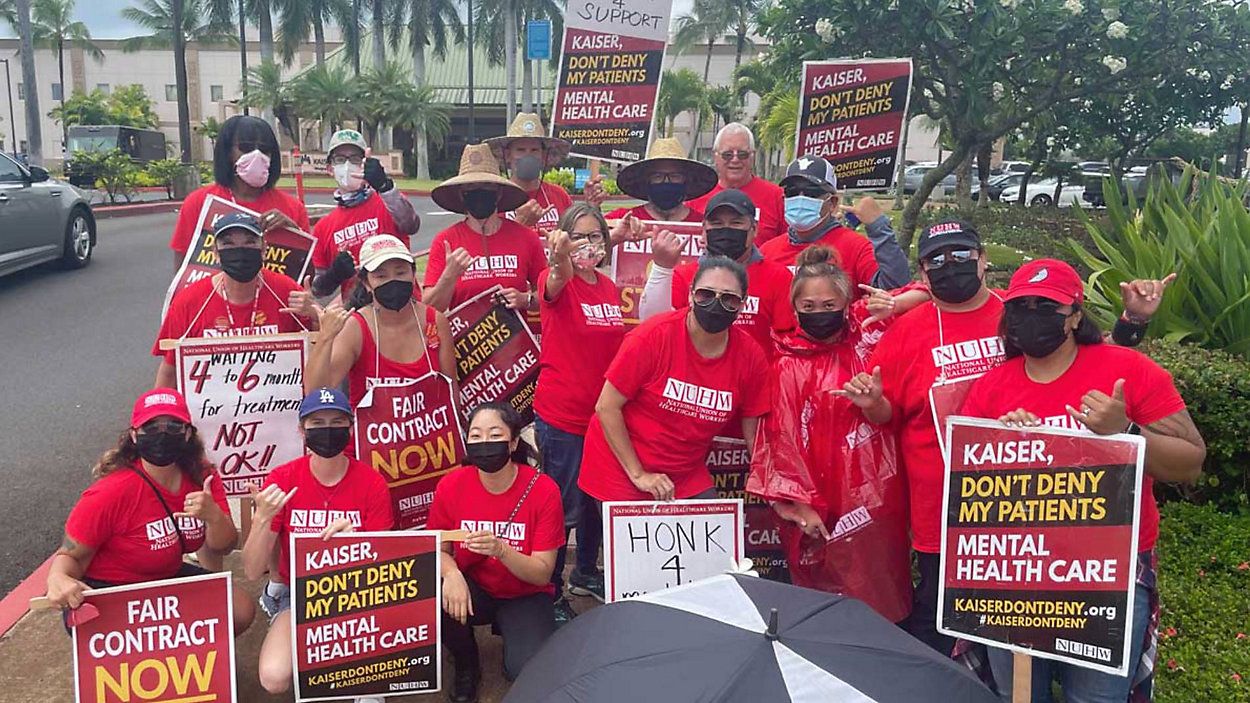U.S. Sen. Mazie Hirono and six Senate colleagues are putting pressure of Kaiser Permanente to resolve a standoff with striking mental and behavioral health workers in Hawaii.
In a letter to Kaiser CEO Greg Adams, the senators urged Kaiser to negotiate in good faith with the National Union of Healthcare Workers, which represents the 57 psychologists, clinical social workers and nurses who have been on strike for 16 weeks in opposition to understaffing and long wait times for patients.
“More than ever, health systems with the kind of market penetration Kaiser has in Hawaii should be working to ensure patients receive the timely, medically necessary mental health services essential for protecting the wellbeing of our communities,” the lawmakers wrote. “This level of care requires retaining the current skilled workforce and recruiting new talent into the state — not engaging in years-long contract disputes. These workers deserve a fair wage, and patients deserve dependable, quality care.”
The senators wrote that Kaiser has “refused to negotiate in good faith a reasonable salary and workload demands” for the workers, despite reporting a record $8.1 billion in net income in 2021.
The senators also cited recent agreements between Kaiser and its workforce, including a 2021 pact with 32,000 workers from various unions and more recent agreement with mental and behavioral health workers in California that ended a 10-week strike.
“Your company has shown a willingness to broker good faith agreements with workers in other states,” they wrote. “We ask that you make that same effort with workers on strike in Hawaii — even if they represent a smaller population of clinicians. Kaiser’s mental and behavioral health workers in Hawaii deserve the same level of investment and parity as their mainland counterparts.”
Co-signing the letter with Hirono were Sens. Bernie Sanders, I-Vt.; Elizabeth Warren, D-Mass.; Ron Wyden, D-Ore.; Richard Durbin, D-Ill.; Kirsten Gillibrand, D-N.Y.; and Chris Coons, D-Del.
In a statement released on Wednesday, Kaiser said it is “deeply disappointed” that the strike continues and argued that it has negotiated in good faith with the union, including its latest offer, which includes “a wage proposal that is above market for mental health professionals in Hawaii.”
The company accused the union of compromising patients to gain leverage for negotiations.
“While NUHW claims to be advocating to improve mental health care, a number of NUHW activists have been contacting community therapists encouraging them not to see Kaiser Permanente patients during the strike,” the statement read. “We were dismayed by these actions. Interfering with needed patient care should not be a bargaining strategy.”
Kaiser said it continues to make investments to improve and expand mental and behavioral health care access and quality.
“In addition to our focus on hiring and retention, Kaiser Permanente has been working diligently to find community providers with new or additional capacity to see our patients,” the statement read. “We have contracted and credentialed 52 additional external providers since the strike began and have several dozen existing contracted providers opening additional appointments for Kaiser Permanente members. Currently, there are more than 100 Kaiser Permanente contracted mental health providers accepting new patients.”
We will continue to bargain in good faith with NUHW and strongly believe that the bargaining table, not a public forum, is the best place for substantive and productive labor negotiations,” Kaiser said.
Michael Tsai covers local and state politics for Spectrum News Hawaii.








